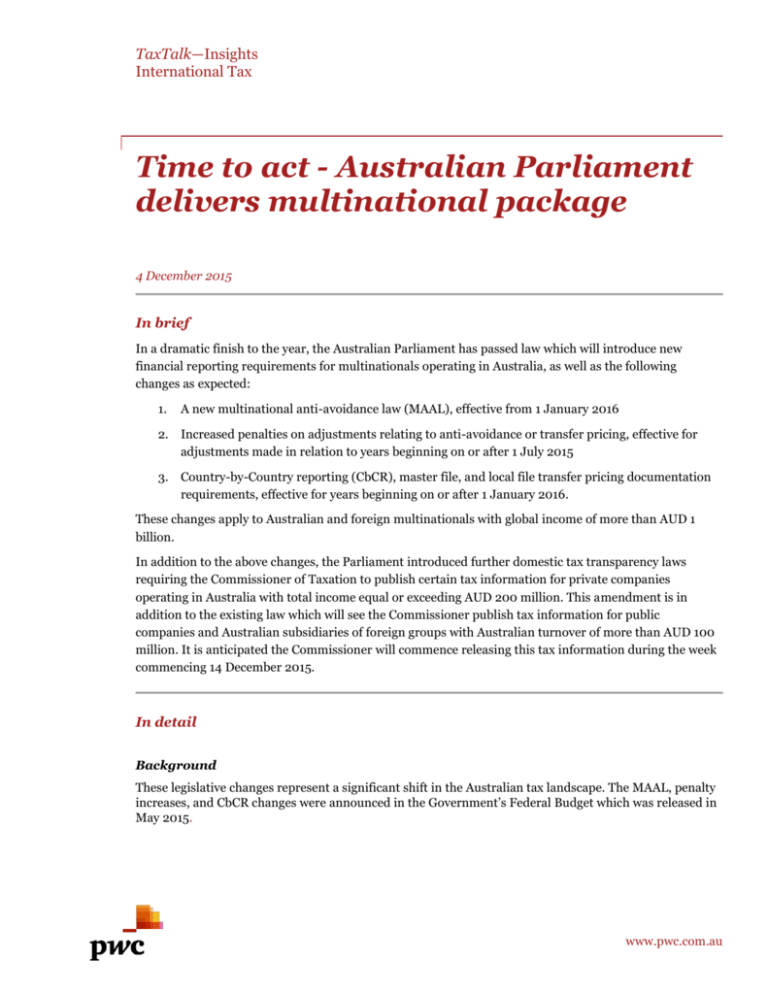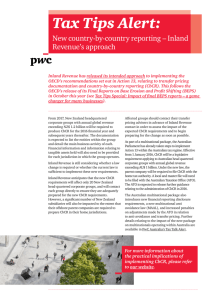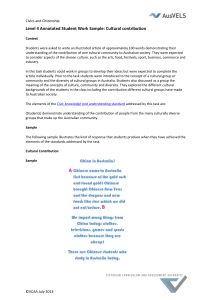
TaxTalk—Insights
International Tax
Time to act - Australian Parliament
delivers multinational package
4 December 2015
In brief
In a dramatic finish to the year, the Australian Parliament has passed law which will introduce new
financial reporting requirements for multinationals operating in Australia, as well as the following
changes as expected:
1.
A new multinational anti-avoidance law (MAAL), effective from 1 January 2016
2. Increased penalties on adjustments relating to anti-avoidance or transfer pricing, effective for
adjustments made in relation to years beginning on or after 1 July 2015
3. Country-by-Country reporting (CbCR), master file, and local file transfer pricing documentation
requirements, effective for years beginning on or after 1 January 2016.
These changes apply to Australian and foreign multinationals with global income of more than AUD 1
billion.
In addition to the above changes, the Parliament introduced further domestic tax transparency laws
requiring the Commissioner of Taxation to publish certain tax information for private companies
operating in Australia with total income equal or exceeding AUD 200 million. This amendment is in
addition to the existing law which will see the Commissioner publish tax information for public
companies and Australian subsidiaries of foreign groups with Australian turnover of more than AUD 100
million. It is anticipated the Commissioner will commence releasing this tax information during the week
commencing 14 December 2015.
In detail
Background
These legislative changes represent a significant shift in the Australian tax landscape. The MAAL, penalty
increases, and CbCR changes were announced in the Government’s Federal Budget which was released in
May 2015.
www.pwc.com.au
However, recent political manoeuvring meant there was some doubt over whether the laws would be
passed this year because a standoff had arisen over amendments proposed in the Senate. The Government
originally rejected these amendments, but eventually reached a compromise which involved accepting one
amendment in its entirety (the requirement to prepare general purpose financial statements) and another
in part (expanding the domestic tax transparency laws to apply to Australian private companies with
turnover of more than AUD 200 million, rather than the AUD 100 million threshold proposed in the
Senate’s original amendment).
Financial reporting
The law requiring ‘significant global entities’ (i.e. entities that are part of a group with global income of
more than AUD 1 billion) to prepare general purpose financial statements for their Australian operations
is a significant change which will potentially impact many multinationals with operations in Australia.
While some Australian subsidiaries and branches of multinationals already prepare general purpose
financial statements, others prepare special purpose financial statements (which contain more limited
disclosures), and some do not prepare Australian financial statements at all. The new financial reporting
requirements will apply for years beginning on or after 1 July 2016.
The general purpose financial statements will need to be submitted by the taxpayer to the Australian
Taxation Office (ATO) by the time of filing the tax return if they have not previously been filed with the
Australian Securities and Investments Commission (ASIC). The ATO will be required to share the
financial statements it receives with ASIC. Documents filed with ASIC are available to the public, so unlike
CbCR, which only requires information to be provided to tax authorities, this change will increase public
transparency over the financial affairs of multinationals’ Australian operations. This was the key reason
behind the change.
There does not appear to be any discretion for the ATO to provide exemptions from the reporting
requirements. Penalties for non-compliance will be based on the administrative penalties that taxpayers
can incur for failing to lodge their tax returns.
As a late amendment to the bill with no prior public consultation, there is not as much detail available on
this change as for the other items in the legislative package. As a result there are many questions about
how the law will apply in practice. It will be interesting to see how the Government, ATO, and ASIC
address this.
The Multinational Anti-Avoidance Law (MAAL)
The MAAL amends Australia’s anti-avoidance rules to introduce a targeted anti-avoidance law which
applies to multinationals that supply goods or services to Australian customers and record the revenue
from those sales overseas. The law will apply where an Australian related entity of the foreign seller
performs activities connected with the sales (e.g. marketing services), and it would be concluded that the
arrangement was entered into with a principal purpose of avoiding tax in Australia or reducing their
foreign tax liability. The law was originally intended to target 30 unnamed multinationals, but the number
of taxpayers who will be impacted is likely to be much higher than this. The MAAL will apply from 1
January 2016.
Where the MAAL applies, the foreign entity will be taxed as if it had made the sales through a deemed
Australian permanent establishment (PE). This means it will be subject to Australian tax on the notional
profits attributable to the deemed PE, as well as withholding taxes where royalty or interest expenses are
attributable to the deemed PE. Penalties will also apply on top of these taxes, generally at a rate of 100%.
PwC
Page 2
Unlike the general anti-avoidance rule, the MAAL will involve a lower threshold ‘purpose’ test to be met of
‘one or more of the principal purposes’ and it will allow foreign tax purposes to be included in that
consideration.
The ATO has issued a Law Companion Guideline which provides guidance on how the ATO intends to
apply the MAAL. The Guideline includes examples illustrating situations where the ATO considers there is
either a high risk or a low risk of the MAAL applying. It also includes a series of framing questions that the
ATO will consider when determining whether the MAAL applies to a particular taxpayer. The ATO is
encouraging taxpayers to approach it proactively to discuss how the MAAL may apply to their particular
circumstances.
The tax and penalty costs that taxpayers could be exposed to if they are caught by the MAAL are
potentially significant, and could give rise to material uncertain tax positions that will need to be reported
in the group’s financial statements. Given the potentially serious consequences, many taxpayers are
evaluating what action they can take to reduce or eliminate the risk of the MAAL applying, and whether it
is appropriate to approach the ATO to discuss their arrangements. With application from 1 January 2016
there is limited time available for taxpayers to make changes to reduce the risk of the MAAL applying, so
for those taxpayers who are potentially impacted, it is critical to assess the options available and decide
how to proceed as soon as possible.
Country-by-Country Reporting (CbCR)
The CbCR law will apply for years beginning on or after 1 January 2016, in line with the Organisation for
Economic Co-operation and Development’s (OECD) recommendation. All Australian and foreign groups
with an Australian presence with global turnover of more than AUD 1 billion will need to file the master
file and local file with the ATO. The CbCR is expected to be filed by the parent company of the group with
their home tax authority, so Australian multinationals will need to file the CbCR with the ATO.
The ATO has begun to develop guidance on how it will administer the CbCR requirements. A Law
Companion Guideline is expected to be released imminently to provide preliminary guidance, with further
detailed guidance to follow in 2016. Based on consultation with the ATO so far, we expect the preliminary
guidance to cover the following:
Expectations for Australian subsidiaries where the parent company is not required to prepare
the CbCR and master file
We understand the ATO intends to provide relief to subsidiaries from producing the CbCR and
master file in these circumstances but will still require a local file to be produced.
Local file information requirements
The ATO is proposing three different types of local files:
o
A full local file
o
A simplified local file
o
A short form local file.
The simplified and short form local files will be available for taxpayers with relatively low risk or
immaterial transfer pricing arrangements. Taxpayers with advance pricing arrangements (APAs)
may be eligible for one of these options. The specific content to be included in each type of local
file, and the eligibility criteria for each will be covered in later guidance.
PwC
Page 3
Possible exemptions
From what we understand the ATO will only exercise its discretion to provide exemptions in very
limited circumstances.
We consider the key challenges for taxpayers in preparing for the CbCR requirements will include:
Extracting the necessary data from reporting systems and reconciling it with other information
reported publicly and to regulators
Ensuring consistency between the global master file and local files in individual countries
Anticipating risks that may be highlighted to tax authorities when they review the CbCR, master
file and local file, and developing a plan to address any such risks.
Although the first reports will not be due to be filed until late 2017, we are aware that many multinationals
are already beginning to consider their CbCR readiness, for example by conducting a dry run of the CbCR
and/or by drafting their transfer pricing documentation in a structure aligned with the master file / local
file format.
Significant increase in penalties for anti-avoidance and transfer pricing adjustments
The increased penalties for significant global entities will apply to adjustments made by the
Commissioner in transfer pricing and anti-avoidance cases for income years beginning on or after 1 July
2015. The higher penalty rates apply to amended assessments made under the existing transfer pricing
and anti-avoidance rules as well as the MAAL. The rates will be up to 100% of the tax shortfall from the
adjustment. Taxpayers that have a ‘reasonably arguable position’ will not be exposed to the higher penalty
rates. It is important to note for transfer pricing cases that a ‘reasonably arguable position’ can only be
established if transfer pricing documentation compliant with Australian requirements was prepared prior
to filing the tax return for the relevant year.
The takeaway
These changes are likely to apply to a wide range of multinationals with operations in Australia.
Accordingly, multinationals operating in Australia should consider the impact of these changes and
should start to prepare for the changes as soon as possible. The MAAL will come into effect from 1
January 2016, so this should be addressed by taxpayers as a priority in order to reduce the risk of tax and
penalty exposures, or adverse uncertain tax position disclosures in their financial statements. It may be
possible that action can be taken before 31 December 2015 to reduce or eliminate potential MAAL
exposures so we recommend taxpayers act quickly on this.
There is more time available to prepare for the CbCR and financial reporting changes, but taxpayers
should be careful not to underestimate the time that will be required to ensure their systems and
processes are ready to produce the information needed. Time and care will also be required to evaluate
what risks tax authorities may identify when they review the information and to consider how these risks
can best be managed.
PwC
Page 4
Let’s talk
For a deeper discussion of how these issues might affect your business, please contact:
Transfer Pricing
Nick Houseman, Sydney
+61 2 8266 4647
nick.p.houseman@au.pwc.com
Lyndon James, Sydney
+61 2 8266 3278
lyndon.james@au.pwc.com
Sarah Stevens, Sydney
+61 2 8266 1148
sarah.m.stevens@au.pwc.com
Tax Controversy
Paul McCartin, Melbourne
+61 3 8603 6509
paul.mccartin@au.pwc.com
Paul McNab, Sydney
+61 2 8266 5640
paul.mcnab@au.pwc.com
International Tax
Peter Collins, Melbourne
+61 3 8603 6247
peter.collins@au.pwc.com
Accounting
Margot Le Bars, Melbourne
+61 3 8603 5371
margo.le.bars@au.pwc.com
Regina Fikkers, Sydney
+61 2 8266 8350
regina.fikkers@au.pwc.com
Julian Griffiths, Melbourne
+61 3 8603 6394
julian.a.griffiths@au.pwc.com
Meina Rose, Sydney
+61 2 8266 2341
meina.rose@au.pwc.com
© 2015 PricewaterhouseCoopers. All rights reserved. In this document, “PwC” refers to PricewaterhouseCoopers a partnership formed
in Australia, which is a member firm of PricewaterhouseCoopers International Limited, each member firm of which is a separate legal
entity. This publication is a general summary. It is not legal or tax advice. Readers should not act on the basis of this publication before
obtaining professional advice. PricewaterhouseCoopers is not licensed to provide financial product advice under the Corporations Act
2001 (Cth). Taxation is only one of the matters that you need to consider when making a decision on a financial product. You should
consider taking advice from the holder of an Australian Financial Services License before making a decision on a financial product.
Liability limited by a scheme approved under Professional Standards Legislation.
PwC
Page 5








